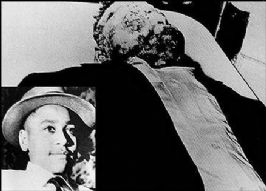Emmett Louis Till was born in Chicago on July 25, 1941. In Chicago, blacks were relatively free from the horrors of lynchings and the threats of the Klan. It was certainly not devoid of racism, but nothing in Chicago prepared Emmett for the summer of 1955 in Mississippi.
At 14, Emmett must have been excited to spend the summer with his cousin, Curtis Jones at Jones' grandfather, Mose Wright's home in Mississippi. As a northern black, Emmett instantly gained near celebrity status. Imagine his thrill as the black youth gathered around Emmett, anxious to hear his stories of the North. I imagine their dialogue drifting into Emmett's boasting of his flirtations with girls, even white girls. The other boys then dared him to go into Bryant's Grocery and Meat Market and talk to the white clerk. Mrs. Carolyn Bryant was working that day and claimed that Emmett came into the store, proud and haughty and that as he left he said, "bye, baby" and "wolf whistled."
During the next four days, Emmett reveled in his success. No one would doubt his stories now. He knew that even in Chicago his actions would have been unacceptable, but what he didn't know was that in Mississippi, his actions would cost him his life.
On the evening of August 28, 1955, Carolyn's husband, Roy and his half brother, J.W. Milam, took young Emmett from Mose Wright's home. They beat him extensively. They shot him in the head, then tied his disfigured, swollen, limp body to a heavy cotton gin and threw him in a river. Three days later, Emmett's mangled body was found.
Mamie Till, Emmett's mother, made a courageous decision. She wanted the world to see the realities of lynchings. She hoped that they would be horrified enough to demand change. She, therefore, decided to have an open casket and to invite the press.
I have seen the television footage. It is horrifying. The image that will always remain with me is of his face; battered, bruised, swollen. I had to strain to see anything human in his features. His eyes, once wide, chocolate brown, and innocent, were swollen completely shut. One eye was missing entirely. His head was swollen from the beatings and days in the river water. Even through his dark complexion, I saw deep bruises all over his body. A shiver ran throughout my body as tears filled my eyes. That shiver returns now.
I try to imagine what he felt, what he thought. Did he beg forgiveness? Did he scream with pain? Or, did he remain defiantly flippant to the end? No one will ever know. Emmett was silenced and his killers only laughed and bragged about their accomplishment. Although many heard them admit to the lynching, Roy Bryant and J.W. Milam were acquitted on September 23, 1955. They later admitted to the murder in a national magazine but could not be prosecuted again. They died free men.
The acquittal and the footage of Emmett's funeral so enraged blacks and whites, that many were moved to action. Emmett became a martyr for the cause. Although still in its infancy, the civil rights movement received many new volunteers and supporters because of the pictures of Emmett Till. Many of the college students who later began SNCC (Student Nonviolent Coordinating Committee) were close to Emmett's age. They remembered. They swore never to forget.
WARNING:
Below is a picture of Emmett before and after his death. It is graphic.
Monday, February 2, 2009
Emmett Till
Posted by highdeekay at 1:49 PM
Labels: America, Black History
Subscribe to:
Post Comments (Atom)

5 response(s):
That is very sickening. Isn't it amazing that average ordinary people can be transformed into violent killers? It's hard to imagine that kind of hate isn't it? Thanks for sharing this story.
I had heard this infamous story, but never seen pictures. Horrifying. Thanks for doing this--I'm looking forward to your other essays.
Very educational. Thanks.
WOW, thank you for sharing. I will be sharing this with Dan. He is fascinated with history and stories like this stick with him.
To think that this stuff happened just 50-60 years is sick! Definitely an awful ending for this young life. Chris' grandma has stories to tell. I keep telling her to write them down so we can help our kids know their history! I want them to know their "black" roots!
Post a Comment